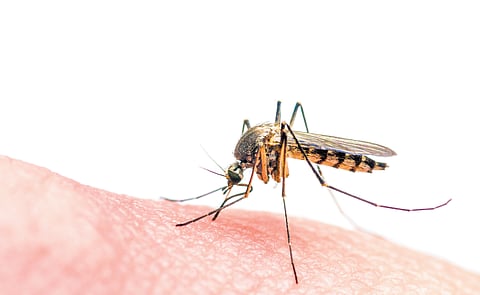

Mosquito trouble hasn’t spared even the serene Dalai Lama. The little insect weighing 2.5 mg elicited another byte of profound wisdom from the Buddhist spiritual leader. “If you think you’re too small to make a difference, try sleeping with a mosquito, said His Holiness the 14th Dalai Lama.” Such is the power of this tiny terror.
A startup in Pune has now taken it on upon itself to wage a war on mosquitoes, vowing to ‘break the chain of breeding’ through a simple device that needs no electricity, charging or batteries.
Prasad Phadke, CEO of EcoBio, says that its efficacy has already been proven successful in the world’s largest slum, Dharavi in Mumbai. About 3,000 Eco BioTraps have been deployed over a year since July 2022 in designated areas of the slum. The study found that the device is 92 per cent effective in preventing egg hatching. And that it is twice more effective in attracting the mosquito to breed (and then kill it).
Seven years of research, 100-plus attractants, over 50 killing ingredients and 66 different sizes and shape iterations later, the team zeroed in on this one design. The Eco BioTrap looks like a used ice cream bucket that can be hung to a nail, except it is not plastic, but made of a biodegradable substance. Each bucket can be used for a month for a 400 sq ft area and then discarded.
They dub it an ultimate protection device from dengue, malaria, chikungunya and other mosquito-borne diseases. So how did the idea strike Phadke? “By thinking like the mother of a mosquito,” he quips. The device is 70 per cent cheaper than other repellent mosquito products on the market.
“Out of the top 50 mosquito scientists on the planet, four of them serve on our board and are deeply involved in the company,” he says with pride, explaining how it works: “When filled with water, the BioTrap mimics the breeding sites of female mosquitoes. Once a mosquito enters to lay eggs, an industry-standard household insecticide ensures 100 per cent that eggs do not hatch, thereby completely eliminating breeding.”
These eco BioTraps are 100 per cent biodegradable after four weeks and it requires no recollection. The insecticide does not come in direct human contact. In addition, deploying BioTraps does not need any training. “They last up to 30 days after which water starts leaking out, thereby posing no risk of becoming a breeding ground,” Phadke assures. A trained eye sees dead eggs and/or larvae.
Currently, around 2,50,000 BioTraps are being used all across India spanning municipal corporations, residential societies, public places, hospitals, schools, etc. In a recent collaboration with pest control company Rentokil PCI, Eco BioTraps was deployed in a defense establishment in Karnataka where there was a dengue outbreak resulting in a remarkable reduction in number of cases from 50 to five within a month. “The strategic use prevented a potential surge to 200 cases, and by the subsequent month, there were no new reported cases,” Phadke adds.
Delving deeper into mosquito stats, Phadke says that one mosquito bite results in the creation of about three crore mosquitoes in a short span of 30 days. This means that the rate at which mosquitoes multiply beats Covid-19 hands down. And how did we beat Covid? By breaking the chain? Phadke applied the same logic to mosquitoes to beat them at their game. “Till there is water on this planet, there will be mosquitoes. This is because mosquitoes only breed on water. The lifespan of an adult female mosquito (that is responsible for dengue and malaria) is only 15-30 days. This means their only job during their short lifespan is to suck human blood and lay 50-200 eggs at a time. That multiplication is never-ending. The only way to ‘outsmart’ them is to make sure there is no water on the planet. As that is impossible, the second option of killing them before they hatch works for us,” he adds.
Why it Matters
India hosts a diverse range of 415 Mosquito species
Nearly 40 million people in India get infected with diseases spread by mosquitoes each year
The nation makes for 1.7% of all malaria cases and 1.2% of all malaria-related fatalities worldwide
India reported 1,93,245 cases of dengue in 2021, resulting in 346 fatalities
Mosquito-borne diseases pose a significant risk to more than 80% of the global population
Transmission occurs primarily through mosquito bites
Vector-borne diseases account for more than 17% of all infectious diseases globally and are responsible for more than 7,00,000 deaths annually
Malaria and dengue alone contribute to nearly 4,50,000 fatalities